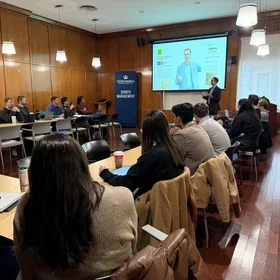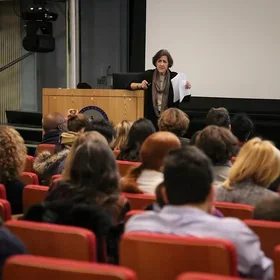In Spring 2021, Sustainability Management student Shubhi Kesarwani arrived in New York City as an Indian international student looking to connect with like-minded people, engage in new opportunities, and develop new sustainability-related skills. Prior to her enrollment into the SUMA program, Kesarwani launched GuruJal, a public-private partnership initiative based in the Gurugram District of India. “The idea is to devise water governance solutions to solve the issues of water scarcity and flooding, which happens periodically in the region. We also prevent the area from desertification by making the Gurugram District more water secure.”
With an organization of her own, Kesarwani came to Columbia “to learn how I can make sustainability investing seem more viable to the investors who I will ask to invest in GuruJal.”
As a sustainability practitioner who mostly works within the water sector, Kesarwani wanted to immerse herself in the Sustainability Management program. Kesarwani is now in her final semester at Columbia, where she serves as President of Columbia’s Indian Student Association, in addition to her role as GuruJal Gurugram’s Founder and Program Director. She recently shared her experience in the program.
What drew you to Columbia's Sustainability Management program as an international student?
Enrolling in Columbia University's Sustainability Management (SUMA) program was a very easy decision for me. First and foremost, Columbia University’s legacy and brand impressed and intrigued me. Since joining the SUMA program, I am proud to become a part of such an international organization like the Earth Institute, which hosts more than 800 research scholars, all practicing or researching life problem statements. SUMA also offers a beautiful course design, offering a well rounded amalgamation of science, policy, management, finance, and economics. Immersing myself into these subjects have allowed me to dive deeper into my interests.
What are you enjoying most about the experience?
I love everything about Columbia and this program! To name a few, I appreciate the opportunity to meet and get acquainted with such senior practitioners and professors within Columbia. I have been taught by brilliant professors like Vance Morella, Upmanu Lall, and Celine Solsken Ruben-Salama. I recommend taking their classes! I have also enjoyed the SUMA courses' immediate relevance, where the topics taught are trending in the industry. Since coming to Columbia, I have also come across an amazing network of friends, which all come from diverse cultures and professional backgrounds.
I would really like to name the amazing student engagement opportunities like SUMA Net Impact and Columbia’s Indian Association and the Indian Regional Co-chair for SPS. These have been amazing opportunities for me where I have been able to connect and network with other people.
How do you foresee your sustainability skills being a part of your current career at GuruJal and beyond?
Three years ago, I created GuruJal, a public private partnership initiative based in the Gurugram District of India. The idea is to devise water governance solutions to solve the issues of water scarcity and flooding, which happens periodically in the region. We also prevent the area from desertification by making Gurugram District more water secure.
While at Columbia, I have been able to use my new sustainability skills to raise funds for GuruJal, develop meaningful collaborations, and gain a new perspective on the world. For example, SUMA courses like Sustainable Forests and Sustainable Agriculture have helped me understand how water connects and deeply impacts other sectors. Corporate Sustainability Reporting (CSR) is another skill I have developed. At GuruJal we have more than 35 corporate clients whom I have been able to collaborate with, so understanding the nuances of business operations and CSR has been beneficial. I have found the Decision Modeling course to be tremendously useful. Through decision models, I am able to make more informed decisions within the local government in a quantified manner that continues to be data-based.
Since joining the program, do you have any helpful tips or suggestions you would give to incoming or prospective students? This can include any extracurricular activities, favorite classes, or a favorite campus/ lunch spot.
I entered the SUMA program during the height of COVID, therefore I experienced some limitations when it came to connecting with other peers. Through this, I recommend reaching out to your Student Association, especially if you are an international student heading to New York City for the first time. Any logistics, such as help with food, Columbia Health Services, Student Welfare were all offered to me as a new student.
I would also scout for internship opportunities in advance, however make sure that you know what experiences you want to gain from these internships! Also, use the first semester to engage with as many student associations as you can. Once you enter your third semester, you will probably most likely be searching for full time work opportunities. Also, use the summer semester, that is a good time to catch up and finish your program early or work for an interesting opportunity.
My favorite class by far would be Sustainable Operations with Professor Vance Merolla. Sustainable Operations is a complete class that gives you a 360 degree industry view, ranging from GHG emission to water management, to waste management, to different parts of sustainability in the real life world, and how to actually report it.
One thing that is highly underutilized in Columbia is the Independent Study class, which is a creative way to introduce problem statements that you want to work on and get other students to become a part of. I ended up doing one in the last semester and that was a tremendous experience for me.
Our ever changing climate is one of the most complex issues facing us today. It involves many dimensions – science, economics, society, politics and moral and ethical questions. It is a global problem, felt on local scales, that will be around for decades and centuries to come. What simple changes students, SUMA and beyond, can do to take part in fighting climate change?
A simple way to become directly involved in sustainability is to act on campus. Becoming a part of a campus sustainability team can be a great first step in learning how to manage an institution with 32,000+ students, with a legacy of 250 years, preaching sustainability to the world. Another thing is for students to learn more and join Columbia’s resource centers. There is an amazing introductory program called the Earth Institute practicum, which introduces you to different research scholars.
Get as many internships as possible, be active and be hands on. That is an opportunity you may not be able to leverage once you step into the industry and have a full time job opportunity, so volunteer as much as you can or become a part of the student government.
Fighting climate change is a progressive approach. It will take time to evolve, but we have to strengthen our choices to make sustainable change on campus, city, country, and future organizations.
Learn more about Columbia University's Sustainability Management program.


